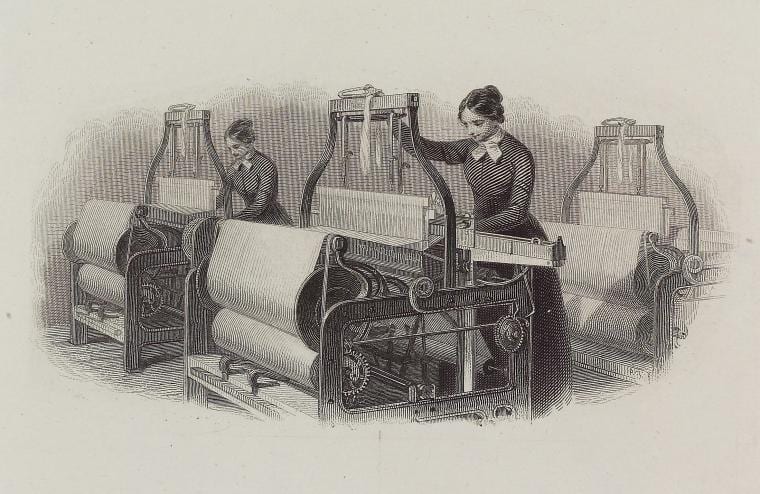Introduction
Founded in the 1820s and named after Francis Cabot Lowell, the inventor of the American power loom, Lowell, Massachusetts, was one of the nation’s most ambitious planned industrial projects. There, at the convergence of two rivers, a group of investors known as the Boston Associates constructed a number of large brick workshops to house the water-powered equipment necessary for each stage of the textile manufacturing process. By consolidating all the stages (cleaning and carding the cotton or wool fibers, spinning them into threads, and finally weaving them into cloth) into one location and relying on the water-powered machines, the Associates were able to produce yardage more efficiently and economically than companies that relied on traditional methods.
By 1840, the city was among the largest manufacturing centers in the United States, its various mills employing thousands of workers. Most of the factory hands were single women, a mixture of immigrants and girls from farming communities around the state who were looking for an opportunity to either contribute to their family’s economic success or to achieve a little bit of financial independence (see “Song of the Spinners”). The “factory girls,” as they were called, signed annual contracts with the companies that owned the mills, which specified that they would live in the company-run boardinghouses, attend church, and follow the time tables and other rules and regulations for moral community living.
As the Lowell system of factory work became more prevalent, so too did the public debate over the justice and morality of such labor. Labor organizers routinely called for a reduction in working hours, citing the ill effects upon the health and morale of workers. Although legislators were often slow to intervene in freely-entered contracts between management and labor, in most states, protective legislation of various kinds did eventually pass, if only to alleviate the concerns and criticisms of labor reformers like Orestes Bronson and William West.
William West, “Wages Slavery and Chattel Slavery,” The Liberator (April 2, 1847); “Wages Slavery and Chattel Slavery,” The Liberator (April 23, 1847). William West (birth and death dates unknown) was a prominent labor reformer from the northeast.
. . . There may be those who believe that wages slaves work when and for whom they please – make their own contracts, are protected by law, etc. . . . [T]his apparent freedom of the wages slaves is wholly fictitious. Instead of working when, and for whom they please, they are glad to work whenever they can get it to do, and for almost anybody who may be willing to employ them.
. . . Instead of being free to make their own contracts, they are not allowed to make any, except such as bitter necessity forces upon them. Is not the price of their labor fixed by the wants (real or imaginary) of their employers? Is it not afterwards regulated by the law of demand and supply? Who pays them more than the market prices? Or who hesitates to discharge them, when their services are no longer needed? . . . How much longer must the just require the passage of laws placing woman (in respect to labor and property) upon terms of equality with man, removing as far as possible, (in this state of society) every temptation to prostitute their persons, either legally or illegally? How much longer must the good and wise demand the abolition of these laws which authorize the traffic in, and monopoly of the LAND? – those laws, but for which, neither wages, not chattel, nor any other form of slavery could exist a moment? How long? how long? . . .
Slavery has been called the “sum of all villainies.” This description of it does not apply to chattel slavery. That is, at least, free from hypocrisy. It does not disguise itself. It appears to be precisely what it is. The whips and the chains, the cruelties of the internal traffic, and the “horrors of the middle passage,” all of the crimes and enormities peculiar to that system, are seen and known of all men. Give even the devil his due. He does not here assume the form of divinity. Wages slavery only is that system of it, to which the above description is justly applicable. Is not that so deceptive in its character, that even many lovers of liberty (yourself among the number) have mistaken it for freedom? Do but consider this question fairly. . . . Is there one evil produced by the chattel system, which is not also produced by the wages? . . .




